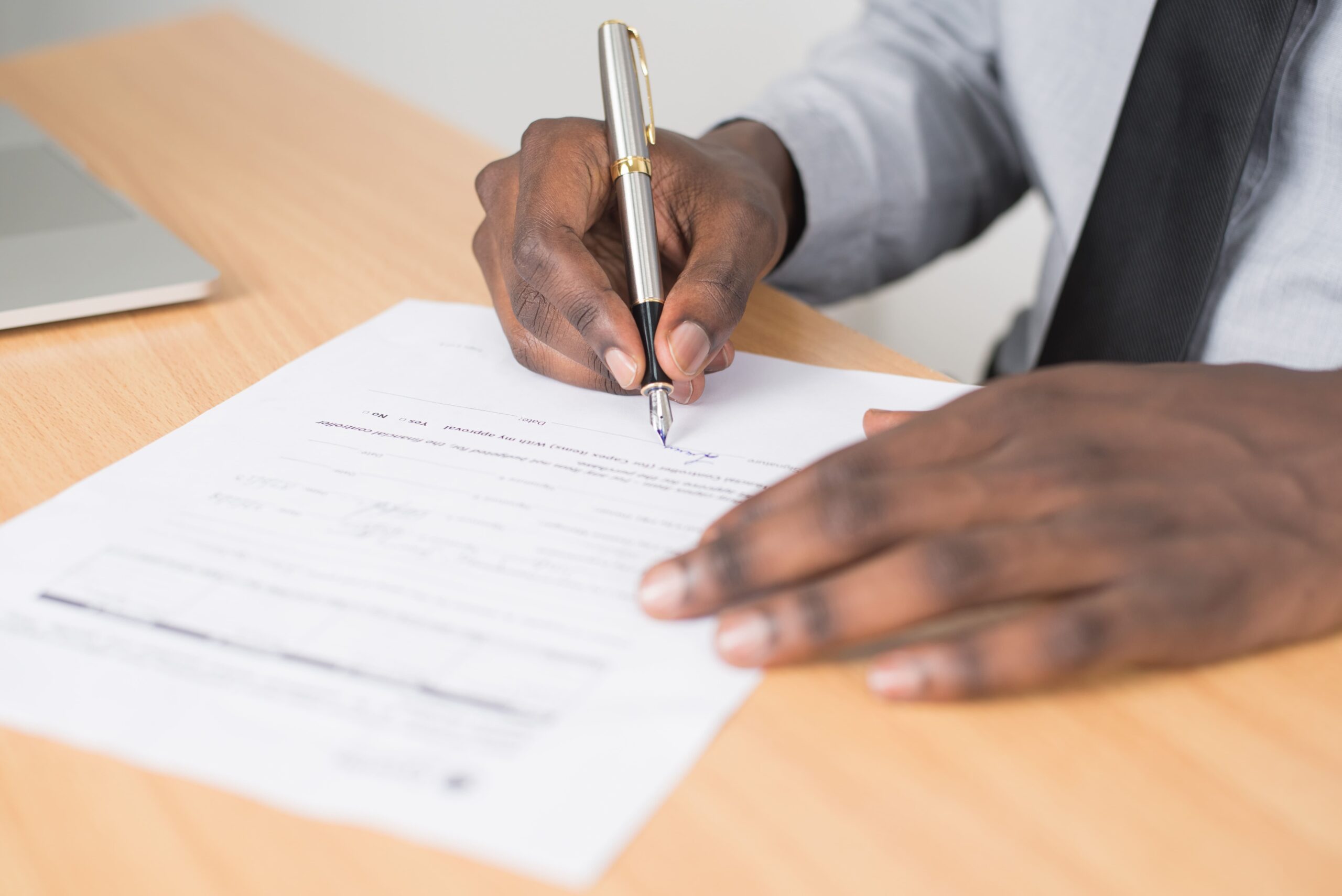Contesting a Will – what you need to know.
If you believe that a will should be contested, then you’ll probably have lots of questions you want to ask us. We regularly deal with Will disputes and aim to find solutions which best protect your interests, whilst also seeking to resolve cases in a timely and cost-effective manner.
Talk to our expert Will dispute lawyers today, they will help you understand whether you have reasonable grounds to contest a Will and your likelihood of success. Or simply read this free guide to Will disputes and then message us to discuss it further.
Will disputes are never easy for the people involved, but together we can create a plan and help you to understand the process better.
Grounds for contesting a Will.
-
The Will wasn't made properly
To be valid a Will must comply with the formal requirements set out in s.9 Wills Act 1837, the Will must:
- Be in writing
- Signed by the person making the Will (or someone else directed by the person making the Will in their presence)
- The signature must take place or be acknowledged in the presence of two witnesses who must also sign the Will (in the presence of the person making the Will and the other witness)
If any of the above have not been complied with the Will is likely to be invalid.
-
There was mental incapacity when the Will was written or amended
To make a Will a person has to be able to:
- Understand the effect of a Will – namely that it is a document that dictates how their assets will be distributed on their death;
- Have a general understanding of the nature and value of their assets;
- Understand who the various people are who may expect to inherit from their estate; and
- Not be suffering from an illness which directly impacts upon their ability to make a decisions about their Will.
If someone doesn’t meet all the necessary requirements at the time the Will is made, it might not be valid. Illnesses such as dementia and Alzheimer’s, together with impaired cognition following a stroke, are among the most common reasons for lacking testamentary capacity. However, there are many other circumstances that can affect someone’s ability to make a valid Will.
-
You feel someone was exerting undue influence
When a person makes a Will they must do so of their own free will. Other people are allowed to make requests or provide advice, but the person making the Will must make the ultimate decision.
Sometimes, particularly where someone is vulnerable, they can be pressured into making a Will in someone’s favour to the extent that they are not acting of their own free will. If this is the case, the Will cannot be valid.
-
Your loved one might not have known what they were signing
The person making the Will must be aware of, and approve, the content of their Will.
This is a separate area to undue influence and mental capacity, although a person’s health may have a bearing on their ability to understand the content of a Will. Concerns about the influence being placed upon a person to execute a new Will could also arise in this context.
An example could include a new Will being prepared for someone who is, for whatever reason, not able to read the document for themselves and has not had the content clearly explained to them.
-
Fraud or forgery
Examples could include forging a person’s signature on a Will, using a copy of the signature on a separate document or seeking to add new pages to an existing Will. We can investigate the circumstances and, where appropriate, instruct expert document examiners to review the Will.
Can you contest a Will before the person has died?
Simply put, no.
This is because a person’s Will only takes effect once they have died. Prior to this, so long as they have the capacity to do so, in most cases a person can change their Will as many times as they like and for whatever reason they see fit.
However, there may be circumstances where it is appropriate to look at making a Will on behalf of someone who has lost capacity. In those scenarios, an application could be made to the Court of Protection for a “Statutory Will”. Whilst this does not involve challenging the validity of an existing Will, these applications can still become contentious and the Court will only approve the making of a new Will where it is deemed to be in that person’s best interests.
These cases are complex and advice will be required to consider whether it is appropriate for your circumstances.
Can you contest a Will after probate?
Yes, you can, but it does become more challenging.
Once probate has been granted, the executors can begin collecting in and distributing the assets of the estate. Once assets have been distributed, recovering them, even if you have a court judgment, becomes significantly more difficult.
If you suspect you may have a claim, it is therefore important that you seek legal advice as soon as reasonably possible.
What if there is a ‘no contest’ clause?
‘No contest’ clauses are added to Wills to discourage beneficiaries from challenging a Will and delaying the distribution of the estate.
Essentially, if you choose to contest a Will which has a “no contest” clause, then you risk losing any inheritance you were initially granted. However, that does not automatically mean a claim should not be pursued – it may be that the potential value of your claim is significantly more than the inheritance you have been left.
It is therefore crucial to discuss this with an expert early on, to assess the strength of your claim and whether it is worth the risk of losing the inheritance provided in the Will.
Who can contest a Will.
If a claim to challenge the validity of a Will is successful, the estate will be distributed in accordance with the previous valid Will, or if there is no previous valid Will, the default rules of intestacy.
You will only be able to challenge the validity of the Will if you benefit under a previous Will or the intestacy rules. It’s therefore important to take advice early on to check whether or not you are eligible to bring a claim.
Who will my claim be against?
Those most likely to be defending the claim are the beneficiaries under the final Will – in particular those who would receive less inheritance in the event of a successful claim.
The executors or personal representatives of an estate will also be involved, but they will need to remain neutral. Their involvement will be limited to providing information on the estate and, where relevant, complying with any agreement reached between the parties or court order made regarding an adjusted distribution of the estate.
What should I do if I think a relative has left a Will, but someone is withholding it from me?
If you’re worried that someone is keeping information about a Will from you, or not letting you see it, we can take action for you. If you’ve already searched for the Will at the Probate Registry then we can apply to the court to make the person concerned produce a copy – or come to court to provide further information.
Who pays to contest a Will?
The starting point is that each party will pay their own costs.
If the matter goes to a final court trial, the general rule is that the loser pays the winner’s costs. It is unusual for everyone’s costs to be paid from the estate.
We recognise that funding the costs of a legal claim is a concern for all clients. We will therefore spend time at the outset of a case considering the funding options available and what would best suit your circumstances.
What options are there for funding a claim?
Your funding options may include:
- funding the costs yourself;
- funding the costs through your legal expenses insurer;
- funding through a “no win no fee” agreement.
However, not all of these options may be right for your case. Whatever your situation, we’ll make sure to keep you fully informed every step of the way. Where appropriate, we try to settle just about every case before it comes to trial, which helps reduce costs and enables you to have more control over the outcome.
How to start the process of contesting a Will.
Once you have made initial contact, we will invite you to have a no obligation discussion with one of our team of lawyers, so we can understand your case and your circumstances better, including a review of the type of case that may be most appropriate for you to pursue.
If a case to challenge a Will proceeds, we are likely to begin with an investigation into the Will making process – which may include requesting information from any solicitors or Will writers involved. We are also likely to advise you to enter a caveat at the Probate Registry, to stop an application from Probate advancing, whilst we are investigating your claim.
Other steps including seeking medical records and contacting witnesses may follow from there, before we spend further time with you considering the evidence and assessing the merits of your claim.
Are there any time limits that may affect my ability to contest a Will?
The time limits that may affect your claim will depend on the type of claim you are looking to bring. Some claims have strict time limits, which may be as short as six months after a grant is obtained from the Probate Registry. However, even if your claim is not subject to a strict time limit, you will want to make sure that the property you are claiming against remains safe and secure. For this reason, whatever the nature of your claim, we recommend getting in touch with us as soon as possible to protect your position.
How long will the dispute last?
Some can last just a few weeks, but others may, unfortunately, take many months to resolve. Whatever your circumstances, we take an active approach and look for practical solutions to help you achieve a resolution. We’ll treat every case as sensitively and efficiently as possible, always focusing on your best interests. Where appropriate, we’ll aim to resolve your case well before trial, so we can hopefully save you time, stress and money.
Will I have to go to court if I’m contesting a Will?
We focus on practical solutions and, where possible, negotiations, to try to reduce the need for our clients to go through an expensive and stressful court process. However, if court action is required, we have the necessary expertise to guide you through the process.
Contact our specialist contested Wills and probate solicitors to find out more about how we can help you make a claim.
Call now










